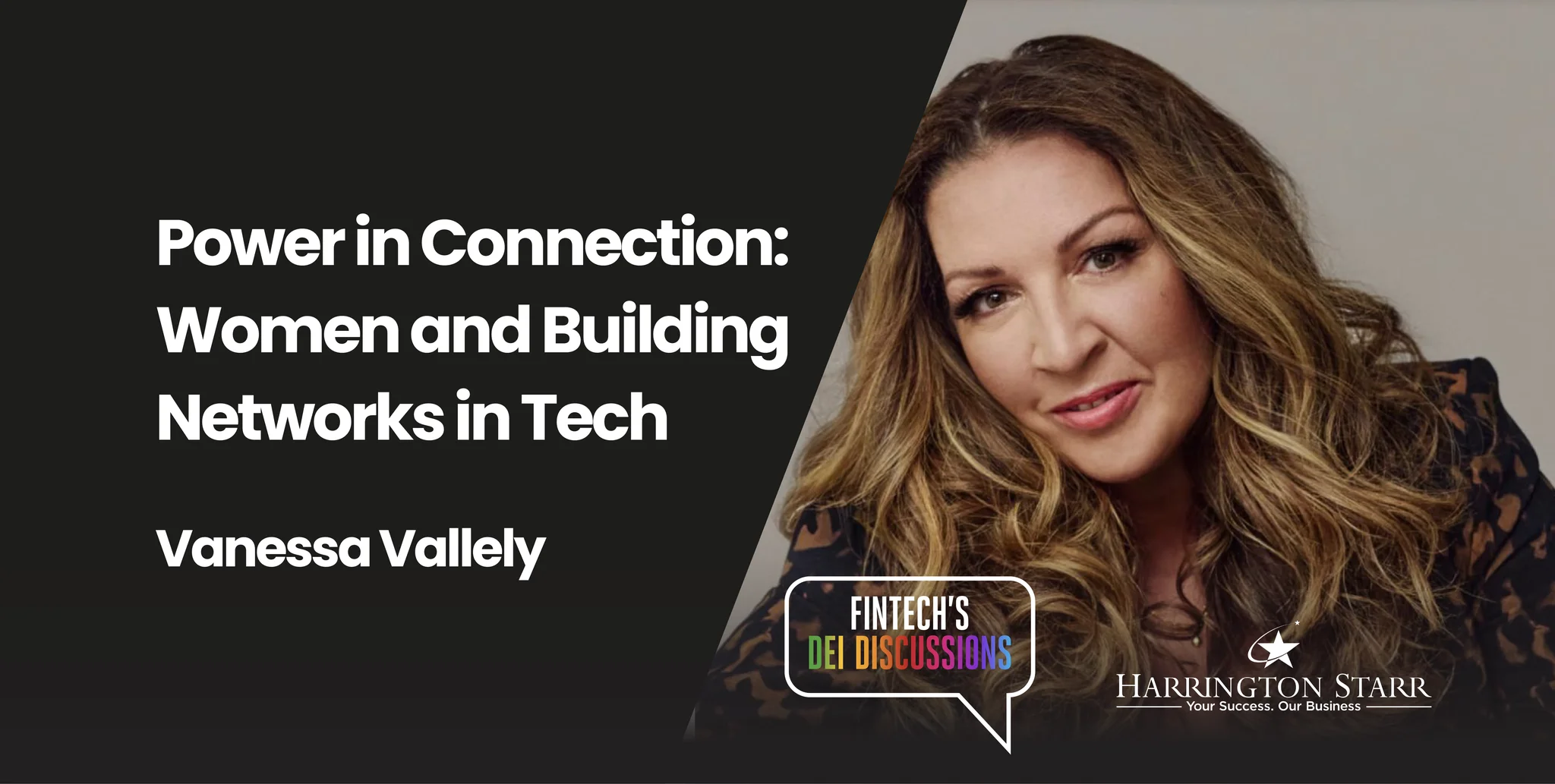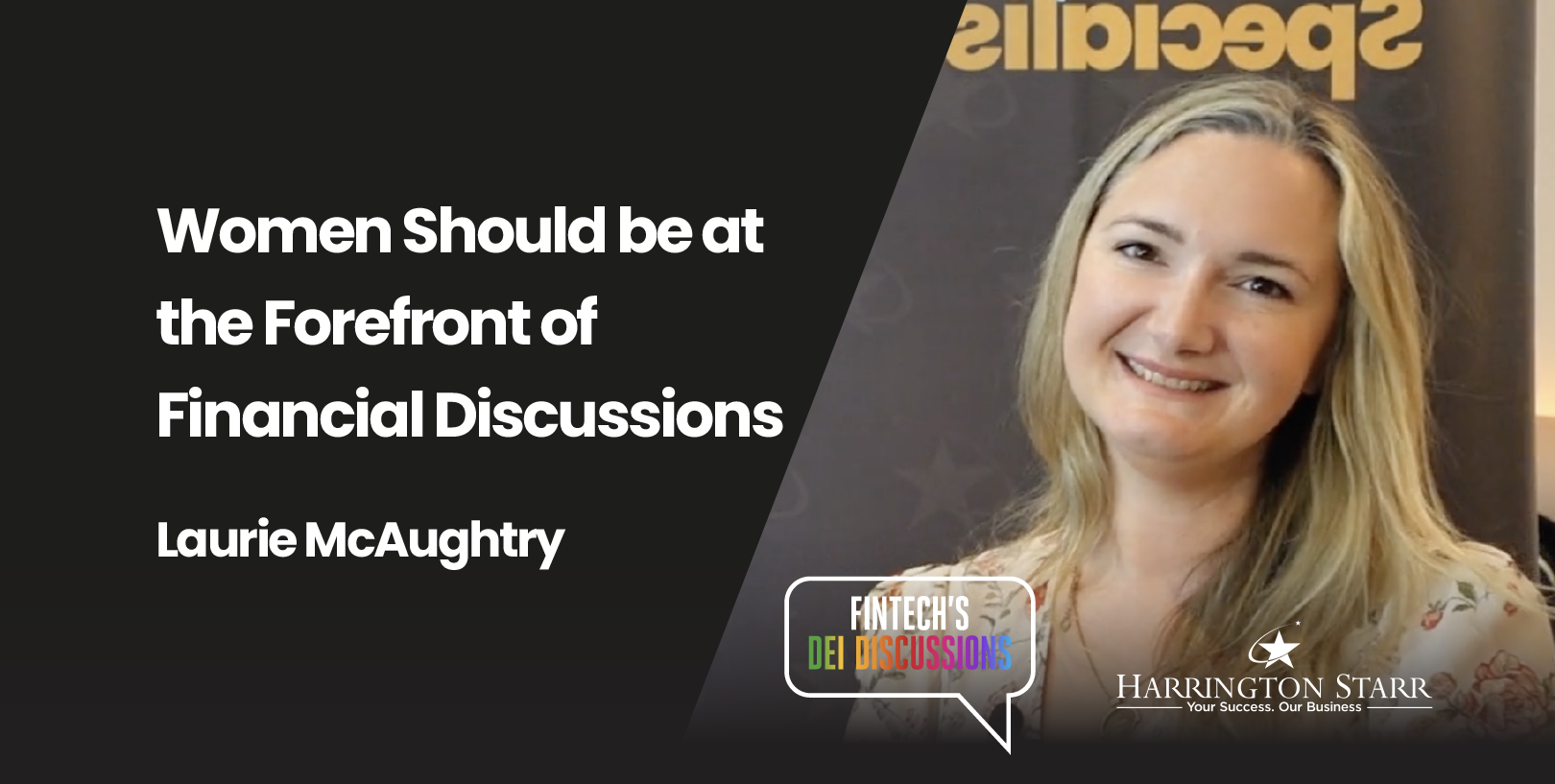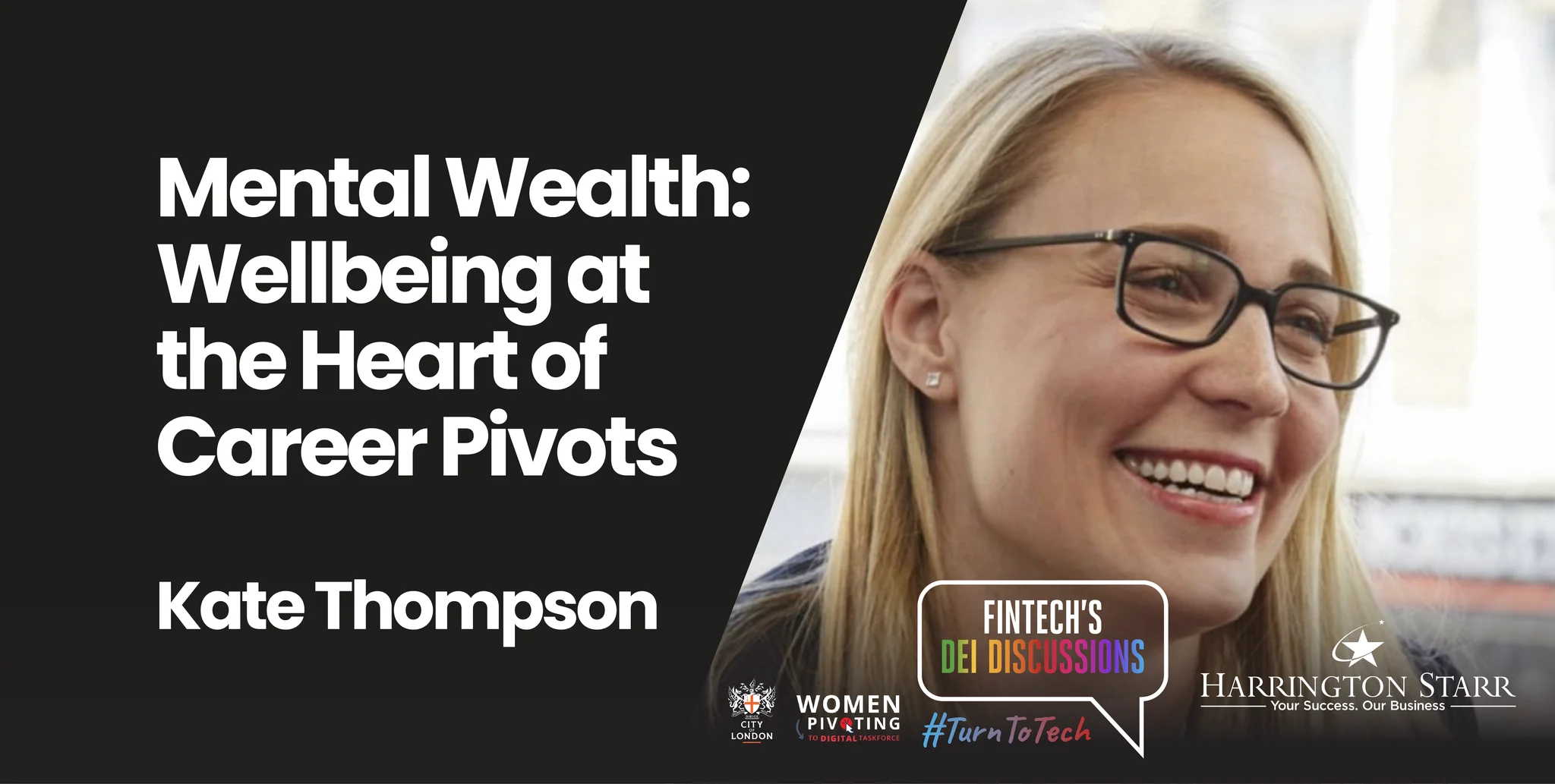
Unlocking Leadership and Independence in Financial Services: Insights from Laurie McAughtry on FinTech’s DEI Discussions
In the latest episode of FinTech's DEI Discussions, host Nadia Edwards-Dashti sits down with Laurie McAughtry, Head of Capital Markets at Euromoney, to discuss a range of topics that are central to the evolving landscape of financial services. Recorded live at the FIX EMEA Trading Conference in London, this episode provides valuable insights into Laurie’s journey, the challenges she faced, and the lessons she learned along the way. With a strong emphasis on independence, leadership, and the transferable skills within the financial services industry, Laurie’s story is both inspiring and instructional for anyone looking to break into or progress within the sector.
Laurie’s career spans over two decades, and throughout this time, she has gained experience in multiple areas of financial services, including banking, financial journalism, and publishing. From her early days in private banking to her current role as Head of Capital Markets at Euromoney, Laurie’s story is a testament to the power of adaptability and resilience in the face of adversity. But her journey is more than just a professional career path—it’s a journey of self-discovery, independence, and the recognition of the unique strengths that women can bring to leadership roles in financial services.
A FinTech Career Built on Resilience and Adaptability
Laurie’s journey into the financial services industry was not a straightforward one, but it is one that showcases how resilience and the willingness to pivot can lead to success. Laurie’s early career began in the banking sector, where she worked as a private banker with Barclays. Laurie’s story of landing a prestigious role in the Barclays high-net-worth graduate scheme, after being one of only eight selected from a pool of 5,000 applicants, is an early indicator of her drive and determination.
However, as with many in the financial services sector, the 2008 financial crisis led to major disruptions in the industry. Laurie found herself at a crossroads in her career as she navigated the changing economic landscape. With a keen sense of foresight, Laurie made the decision to leave her position at Barclays and relocate to Malaysia. This decision, though prompted by personal circumstances—her then-boyfriend asking her to marry him—proved to be a pivotal moment in her career.
In Malaysia, Laurie initially took time off from the professional world. However, Laurie soon found that she could not be content without a professional outlet. Seeking purpose, she turned to financial journalism, eventually working her way up the ladder to become managing editor of a major publication. This transition from private banking to financial journalism and publishing wasn’t just a career shift—it was a testament to Laurie’s ability to identify transferable skills and apply them in new, unfamiliar contexts.
Laurie reflects that her decision to step away from banking was not just about finding a new job, but about finding a new sense of purpose. She had always wanted to do something meaningful with her time, and financial journalism provided the ideal platform for her to pursue her intellectual interests. Moreover, the experience of living abroad, immersing herself in a different culture, and navigating the challenges of a new environment gave Laurie the confidence to reinvent herself and build a new career trajectory.
The Importance of Independence in Financial Tech Career Progression
A major theme throughout Laurie’s career has been her desire for independence—not just financial independence but intellectual and professional independence as well. Laurie explains that the ability to generate her own income, make decisions based on her own judgments, and continue challenging herself with new professional opportunities has been central to her success. Her independent mindset was especially crucial during her time in Malaysia when she had the luxury of not needing to work but chose to pursue professional fulfilment regardless of financial necessity.
Laurie’s commitment to independence also translated into her leadership philosophy. As Head of Capital Markets at Euromoney, Laurie emphasises the importance of self-reliance, both for her own career progression and in how she approaches leadership. As a woman in a male-dominated industry, Laurie highlights that the ability to control one’s own narrative, particularly through media and communication channels, is crucial for success. She firmly believes that women should not have to justify their careers or achievements based on their gender, but rather on their expertise and the value they bring to the table.
Laurie’s experience in leadership, particularly in a global company like Euromoney, has taught her the importance of self-assurance and confidence in one’s abilities. She notes that having the freedom to make independent decisions, without being hindered by preconceived notions or societal expectations, has been an invaluable part of her success. For Laurie, leadership is not about following the crowd but about charting one’s own path and trusting in one’s skills and judgement.
Transitioning Across Financial Roles: The Power of Transferable Skills
Laurie’s career journey is a powerful example of the importance of transferable skills. She has successfully transitioned from banking to financial journalism and now to capital markets, showing that financial services professionals are not confined to a single career track. Laurie points out that this flexibility and adaptability are essential in today’s rapidly evolving financial landscape. The ability to apply one’s skills across different sectors within the industry is what sets successful leaders apart.
In her current role at Euromoney, Laurie works in capital markets, a sector that covers a broad array of services, including financial research, accreditation, and media. Euromoney itself is a global powerhouse in financial services media, known for its comprehensive research reports and data analytics, as well as its award-winning programmes. The company’s work spans several verticals, including transaction banking, capital markets, private banking, and sustainability. Laurie’s deep experience in both publishing and banking has allowed her to thrive in this diverse environment, making her well-suited to her role.
One of the key points Laurie makes during the podcast is that financial services professionals should not limit themselves to one narrow pathway. The financial sector is vast, with many interconnected domains that require different types of expertise. By cultivating a wide skill set and the ability to work across various sectors, professionals can better position themselves for leadership roles and remain adaptable in the face of change.
Women in FinTech Leadership: Changing the Narrative
One of the most powerful aspects of Laurie’s story is her emphasis on the importance of female leadership in financial services. Laurie speaks passionately about the need for women to break away from being boxed into gendered panels and discussions. She calls for women to be recognised and celebrated for their professional expertise rather than their gender or personal experiences. This is a key theme throughout the podcast, and Laurie’s philosophy is clear: women should be at the forefront of financial discussions, not because of their gender, but because of their skills and accomplishments.
Laurie introduces the hashtag #JobsNotGender as a call to action for women in financial services. She believes that when women speak on panels, it should be about their professional expertise and the work they do every day, not about what it’s like to be a woman in the industry. This message is particularly relevant in an industry like financial services, where women are still underrepresented in senior leadership positions. Laurie’s call for change is a reminder that gender should never be the defining characteristic of one’s career, and women should be given the opportunity to showcase their leadership skills on equal footing with their male counterparts.
This concept ties directly into the broader goals of our podcast, FinTech's DEI Discussions, which seeks to bring to light the challenges and opportunities that arise in the context of diversity, equity, and inclusion in the financial sector. By shifting the focus from gender and personal experiences to skill and expertise, the financial services industry can create a more level playing field, where everyone, regardless of gender, has the same opportunities to succeed and thrive.
The Role of Media Training for Women in Financial Services
A key piece of advice Laurie offers in the podcast is the importance of media training for women in the industry. She explains that media training can empower women to have a seat at the table, to speak confidently about their expertise, and to be seen as credible leaders in their field. Laurie reflects on her own experiences working with women in financial services who have incredible expertise but have not been given the platform to share their knowledge due to a lack of media training. Media training equips women with the skills needed to navigate public speaking engagements, interviews, and panel discussions, ensuring that their message comes across clearly and professionally.
For Laurie, this isn’t just about career advancement—it’s about changing the narrative for women in financial services. By ensuring that women are equipped to speak confidently and competently in public forums, the industry can move closer to achieving true gender equality in leadership roles.
Laurie’s advice also underscores the importance of communication skills in today’s fast-paced, media-driven world. As media channels increasingly influence public perception, professionals, particularly women, must be prepared to manage their personal brands and articulate their professional accomplishments. Media training, Laurie argues, is an essential tool for ensuring that women’s voices are heard and respected in the financial services industry.
Financial Technology Networking: The Key to Career Advancement
Finally, Laurie offers some invaluable advice for anyone looking to progress in their financial services career: network, network, network. She stresses that career progression is not just about working hard—it’s about making connections, forming relationships, and putting yourself in situations where you can meet people and make an impression. Laurie herself attends between 25 and 50 events every year, constantly expanding her network and building relationships with key players in the industry.
Networking, according to Laurie, is not about favouring one group over another or engaging in nepotism. It’s about creating opportunities for growth by continuously building connections and making yourself known in the industry. She encourages listeners to take the initiative to reach out, set up meetings, and engage with others in meaningful ways. It’s these efforts that will ultimately lead to career opportunities down the line.
Laurie’s networking philosophy is rooted in authenticity. She believes that the best way to form lasting connections is by showing genuine interest in others and building relationships based on trust and mutual respect. This approach has allowed her to build a wide and diverse network of professionals, which has helped her throughout her career.
Conclusion
In this episode of FinTech's DEI Discussions, Laurie McAughtry provides an insightful look into the world of financial services, leadership, and career progression. Her story is one of resilience, adaptability, and a constant drive for independence. She encourages women to embrace their professional expertise, to seek media training to amplify their voices, and to take ownership of their career paths. Her message is clear: it’s not about gender—it’s about job performance, skill, and leadership. For those looking to break into or progress within the financial services industry, Laurie’s advice serves as both a roadmap and a source of inspiration.
This episode of FinTech’s DEI Discussions aligns perfectly with Harrington Starr’s commitment to advancing diversity, equity, and inclusion in the financial services sector. As a leading FinTech recruitment business, Harrington Starr actively works to support the growth of a more inclusive and diverse workforce, particularly within the leadership ranks. Laurie McAughtry’s insights on the importance of women in leadership, transferable skills, and breaking away from gendered narratives resonate with Harrington Starr’s mission to place talented individuals, regardless of gender or background, into positions where they can thrive. Furthermore, her focus on media training for women and the importance of networking ties into Harrington Starr's approach of empowering candidates with the skills and confidence to succeed in the competitive FinTech market. This episode underscores Harrington Starr’s core values of fostering talent, encouraging career progression, and driving positive change within the industry.





